May 2021 in “Faculty Opinions – Post-Publication Peer Review of the Biomedical Literature” Clinicians need to better understand and treat Post-finasteride syndrome.
 41 citations,
October 2012 in “Australian and New Zealand Journal of Psychiatry”
41 citations,
October 2012 in “Australian and New Zealand Journal of Psychiatry” Negative expectations can cause adverse effects in patients even without active treatment, and managing this nocebo effect involves better communication and patient-clinician relationships.
 5 citations,
September 2021 in “Southern African Journal of Hiv Medicine”
5 citations,
September 2021 in “Southern African Journal of Hiv Medicine” The guideline provides healthcare professionals in South Africa with instructions for comprehensive, multidisciplinary gender-affirming care, including HIV prevention and treatment for transgender and gender diverse individuals.
30 citations,
January 2020 in “Fertility and Sterility” Finasteride can cause serious side effects in some men, needing more research for treatment.
 21 citations,
May 2021 in “Patient education and counseling”
21 citations,
May 2021 in “Patient education and counseling” Managing PCOS is hard because it varies a lot, treatments are limited, and there's a lot of false information online.
 3 citations,
March 2019 in “Post Reproductive Health”
3 citations,
March 2019 in “Post Reproductive Health” Testosterone replacement can help menopausal women with various symptoms, but should be used carefully and is not yet officially licensed in the UK for women.
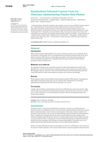
A standardized consent form for PRP injections improves patient trust and legal protection.
19 citations,
December 2008 in “Arthritis Care & Research” The decision board effectively helps lupus nephritis patients in Brazil choose treatments by clearly presenting options and side effects.
 15 citations,
February 2019 in “Internal Medicine Journal”
15 citations,
February 2019 in “Internal Medicine Journal” Australian doctors experienced in adult transgender healthcare mostly prescribe intramuscular testosterone and oral estradiol, recommend mental health assessments before hormone therapy, and support improved training and guidelines.
 10 citations,
June 2010 in “Fertility and Sterility”
10 citations,
June 2010 in “Fertility and Sterility” Patients with PCOS tend to score their hirsutism higher than clinicians, making self-scoring less useful for diagnosis.
1 citations,
June 2020 in “The Journal of Urology”  August 2021 in “Annals of Agricultural and Environmental Medicine”
August 2021 in “Annals of Agricultural and Environmental Medicine” The article concludes that understanding Frontal Fibrosing Alopecia (FFA) is crucial for effective treatment, which includes medication like 5α-reductase inhibitors and hydroxychloroquine.
 7 citations,
August 2018 in “South African Medical Journal”
7 citations,
August 2018 in “South African Medical Journal” Clinicians should understand tattoos to manage health issues, as tattoos can cause complications and affect medical assessments.
 1 citations,
January 2024 in “Curēus”
1 citations,
January 2024 in “Curēus” Clinicians should use social and prescription data to track trends in performance-enhancing drug use.
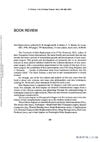 January 1997 in “Journal of Toxicology-cutaneous and Ocular Toxicology”
January 1997 in “Journal of Toxicology-cutaneous and Ocular Toxicology” The book "Hair Replacement" is a detailed guide on hair transplant and treatments, useful for surgeons and clinicians.

Clinicians should look for skin issues, sleep problems, cognitive changes, and food cravings as signs of insulin resistance.
 September 2015 in “British Journal of Dermatology”
September 2015 in “British Journal of Dermatology” Most clinicians follow discharge guidelines, many lupus patients don't use sunscreen regularly, dithranol is effective for psoriasis, biopsy methods should be based on lesion type, voriconazole may raise skin cancer risk, a new scale can help diagnose female hair loss early, and most melanomas may develop from existing moles.
 20 citations,
October 2013 in “British Journal of Dermatology”
20 citations,
October 2013 in “British Journal of Dermatology” The document concludes that clinicians should be aware of common hair and scalp disorders in women of African descent and that more research is needed to develop effective treatments.
 3 citations,
July 2012 in “British journal of hospital medicine”
3 citations,
July 2012 in “British journal of hospital medicine” The guide helps clinicians diagnose and manage hair loss, detailing examination techniques and treatments for different types of alopecia.
 52 citations,
March 2016 in “JAMA dermatology”
52 citations,
March 2016 in “JAMA dermatology” Patients with PCOS rate their hirsutism higher than clinicians, and these self-ratings are more closely related to their quality of life and risk of depression.
 May 1999 in “Journal of Oral and Maxillofacial Surgery”
May 1999 in “Journal of Oral and Maxillofacial Surgery” The book provides practical guidance on cosmetic facial surgery for clinicians.
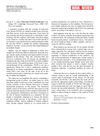 December 2001 in “Fertility and Sterility”
December 2001 in “Fertility and Sterility” The book provides a clear overview of PCOD and is recommended for medical trainees and clinicians, but may lack depth for advanced researchers.
 2 citations,
October 2022 in “Current Allergy and Asthma Reports”
2 citations,
October 2022 in “Current Allergy and Asthma Reports” Biologic therapies can cause various adverse events, but allergy/immunology clinicians can manage them.
 1 citations,
April 2022 in “Annals Academy of Medicine Singapore”
1 citations,
April 2022 in “Annals Academy of Medicine Singapore” PCOS care in Singapore can be bettered by refining referral systems, standardizing diagnosis and treatment, enhancing complication screening, and offering educational resources for clinicians.
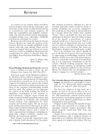 February 2004 in “Plastic and Reconstructive Surgery”
February 2004 in “Plastic and Reconstructive Surgery” The book is a detailed guide on experimental wound healing methods, useful for researchers but not for clinicians.
 15 citations,
October 2017 in “Journal of Cosmetic and Laser Therapy”
15 citations,
October 2017 in “Journal of Cosmetic and Laser Therapy” FDA-cleared devices may help treat hair loss, but more research needed; consult dermatologist before use.
14 citations,
March 2001 in “Psychiatric Services” Older men should openly discuss sexual health with doctors to improve their quality of life.
 1 citations,
September 2015 in “Clinics in Dermatology”
1 citations,
September 2015 in “Clinics in Dermatology” The guide helps doctors diagnose hair problems by suggesting a thorough patient history, physical exams, and various diagnostic tools.
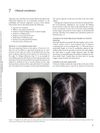 1 citations,
April 2012 in “Informa Healthcare eBooks”
1 citations,
April 2012 in “Informa Healthcare eBooks” The conclusion is that detailed clinical descriptions help pathologists diagnose hair loss conditions more accurately.
 5 citations,
October 2012 in “Journal of Midwifery & Women's Health”
5 citations,
October 2012 in “Journal of Midwifery & Women's Health” Healthcare providers should start with simple fertility tests and treatments before referring patients to specialists.
























